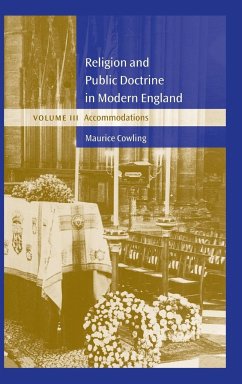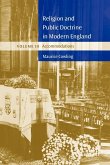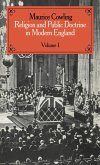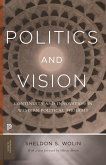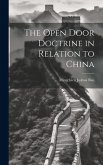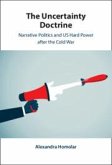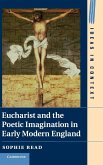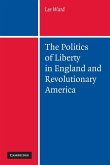Maurice Cowling
Religion and Public Doctrine in Modern England
Maurice Cowling
Religion and Public Doctrine in Modern England
- Gebundenes Buch
- Merkliste
- Auf die Merkliste
- Bewerten Bewerten
- Teilen
- Produkt teilen
- Produkterinnerung
- Produkterinnerung
- Weitere 5 Ausgaben:
- Gebundenes Buch
- Gebundenes Buch
- Broschiertes Buch
- Broschiertes Buch
- Broschiertes Buch
A massive and authoritative contribution to the intellectual and cultural history of modern England.
Andere Kunden interessierten sich auch für
![Religion and Public Doctrine in Modern England Religion and Public Doctrine in Modern England]() Maurice CowlingReligion and Public Doctrine in Modern England67,99 €
Maurice CowlingReligion and Public Doctrine in Modern England67,99 €![Religion and Public Doctrine in Modern England Religion and Public Doctrine in Modern England]() Maurice CowlingReligion and Public Doctrine in Modern England149,99 €
Maurice CowlingReligion and Public Doctrine in Modern England149,99 €![Politics and Vision Politics and Vision]() Sheldon S. WolinPolitics and Vision24,99 €
Sheldon S. WolinPolitics and Vision24,99 €![The Open Door Doctrine in Relation to China The Open Door Doctrine in Relation to China]() Mingchien Joshua BauThe Open Door Doctrine in Relation to China38,99 €
Mingchien Joshua BauThe Open Door Doctrine in Relation to China38,99 €![The Uncertainty Doctrine The Uncertainty Doctrine]() Alexandra HomolarThe Uncertainty Doctrine119,99 €
Alexandra HomolarThe Uncertainty Doctrine119,99 €![Eucharist and the Poetic Imagination in Early Modern England Eucharist and the Poetic Imagination in Early Modern England]() Sophie ReadEucharist and the Poetic Imagination in Early Modern England112,99 €
Sophie ReadEucharist and the Poetic Imagination in Early Modern England112,99 €![The Politics of Liberty in England and Revolutionary America The Politics of Liberty in England and Revolutionary America]() Lee WardThe Politics of Liberty in England and Revolutionary America48,99 €
Lee WardThe Politics of Liberty in England and Revolutionary America48,99 €-
-
-
A massive and authoritative contribution to the intellectual and cultural history of modern England.
Hinweis: Dieser Artikel kann nur an eine deutsche Lieferadresse ausgeliefert werden.
Hinweis: Dieser Artikel kann nur an eine deutsche Lieferadresse ausgeliefert werden.
Produktdetails
- Produktdetails
- Verlag: Cambridge University Press
- Seitenzahl: 792
- Erscheinungstermin: 30. März 2016
- Englisch
- Abmessung: 240mm x 161mm x 47mm
- Gewicht: 1338g
- ISBN-13: 9780521259606
- ISBN-10: 0521259606
- Artikelnr.: 29337535
- Herstellerkennzeichnung
- Libri GmbH
- Europaallee 1
- 36244 Bad Hersfeld
- gpsr@libri.de
- Verlag: Cambridge University Press
- Seitenzahl: 792
- Erscheinungstermin: 30. März 2016
- Englisch
- Abmessung: 240mm x 161mm x 47mm
- Gewicht: 1338g
- ISBN-13: 9780521259606
- ISBN-10: 0521259606
- Artikelnr.: 29337535
- Herstellerkennzeichnung
- Libri GmbH
- Europaallee 1
- 36244 Bad Hersfeld
- gpsr@libri.de
Maurice Cowling was born in London in 1926. He was educated at Battersea Grammar School and Jesus College, Cambridge, where he read History. He did military service between 1944 and 1948 in the British and Indian armies. He as a Fellow of Jesus College from 1950 to 1953 and, after a period spent chiefly in London, returned to Jesus as a Fellow in 1961. Since 1963 he has been a Fellow of Peterhouse, Cambridge, and from 1976-93 University Reader in Modern English History.
Introduction; Part V. The Christian Intellect and Modern Thought in Modern England: 1. The reanimation of protestantism I: Carlyle
Froude and Kingsley; 2. Christianity and literature I: Burke and Disraeli; 3. The reanimation of protestantism II: Thomas Arnold
Bunsen
Jowett
Stanley
Lyall and Max Muller; 4. The enlargement of Christianity: Matthew Arnold
Seeley
Sidgwick and Wicksteed; 5. Christianity and literature II: Dickens
Tennyson
Browning
Pater and Wilde; 6. Christianity and modern knowledge I: Stirling
Wallace
Caird and Green; 7. Whiggism
liberalism and Christianity I: Macaulay
Lecky
Bryce and Fisher; 8. Whiggism
liberalism and Christianity II: Fitzjames Stephen
Acton
Maine
Inge
Henson and Smuts; 9. Christianity and modern knowledge II: Whewell
Stubbs and Cunningham; 10. Christianity in an unfriendly world I: Shaftesbury
Maurice
Westcott
Tawney and Temple; 11. Christianity in an unfriendly world II: Forsyth
Masterman
Gore
Figgis and Lewis; 12. Christianity in an unfriendly world III: Underhill
Eddington
Needham
Zaehner and Jung; 13. Christianity in an unfriendly world IV: Balfour
Ashley and Joseph Chamberlain; 14. Christianity in an unfriendly world V: Milbank and Macintyre; Part VI. The Post-Christian Consensus: 15. Modern knowledge and the post-Christian consensus I: Darwin
Dawkins
Galton and Pearson; 16. Modern knowledge and the post-Christian consensus II: Freud
J. B. S. Haldane
Huxley and Popper; 17. Modern knowledge and the post-Christian consensus III: F. H. Bradley
Bosanquet
R. B. Haldane
A. C. Bradley
Elgar
Parry and Hadow; 18. Modern knowledge and the post-Christian consensus IV: Maitland
Hobhouse
Keynes and Hayek; 19. English socialism as English religion: The Webbs
Macdonald
Laski
Orwell and Crossman; 20. Literature and the post-Christian consensus: Wordsworth
Hardy
Kipling and Forster; 21. Modern knowledge and the post-Christian consensus V: Richards and Leavis; 22. Modern knowledge and the post-Christian consensus VI: Williams
Eagleton
Kenny
Skinner and Scruton; 23. Judaism and the post-Christian consensus: Namier
Berlin
Koestler and Steiner; 24. Complication and dilapidation; Conclusion: the author and the argument; Index.
Froude and Kingsley; 2. Christianity and literature I: Burke and Disraeli; 3. The reanimation of protestantism II: Thomas Arnold
Bunsen
Jowett
Stanley
Lyall and Max Muller; 4. The enlargement of Christianity: Matthew Arnold
Seeley
Sidgwick and Wicksteed; 5. Christianity and literature II: Dickens
Tennyson
Browning
Pater and Wilde; 6. Christianity and modern knowledge I: Stirling
Wallace
Caird and Green; 7. Whiggism
liberalism and Christianity I: Macaulay
Lecky
Bryce and Fisher; 8. Whiggism
liberalism and Christianity II: Fitzjames Stephen
Acton
Maine
Inge
Henson and Smuts; 9. Christianity and modern knowledge II: Whewell
Stubbs and Cunningham; 10. Christianity in an unfriendly world I: Shaftesbury
Maurice
Westcott
Tawney and Temple; 11. Christianity in an unfriendly world II: Forsyth
Masterman
Gore
Figgis and Lewis; 12. Christianity in an unfriendly world III: Underhill
Eddington
Needham
Zaehner and Jung; 13. Christianity in an unfriendly world IV: Balfour
Ashley and Joseph Chamberlain; 14. Christianity in an unfriendly world V: Milbank and Macintyre; Part VI. The Post-Christian Consensus: 15. Modern knowledge and the post-Christian consensus I: Darwin
Dawkins
Galton and Pearson; 16. Modern knowledge and the post-Christian consensus II: Freud
J. B. S. Haldane
Huxley and Popper; 17. Modern knowledge and the post-Christian consensus III: F. H. Bradley
Bosanquet
R. B. Haldane
A. C. Bradley
Elgar
Parry and Hadow; 18. Modern knowledge and the post-Christian consensus IV: Maitland
Hobhouse
Keynes and Hayek; 19. English socialism as English religion: The Webbs
Macdonald
Laski
Orwell and Crossman; 20. Literature and the post-Christian consensus: Wordsworth
Hardy
Kipling and Forster; 21. Modern knowledge and the post-Christian consensus V: Richards and Leavis; 22. Modern knowledge and the post-Christian consensus VI: Williams
Eagleton
Kenny
Skinner and Scruton; 23. Judaism and the post-Christian consensus: Namier
Berlin
Koestler and Steiner; 24. Complication and dilapidation; Conclusion: the author and the argument; Index.
Introduction; Part V. The Christian Intellect and Modern Thought in Modern England: 1. The reanimation of protestantism I: Carlyle
Froude and Kingsley; 2. Christianity and literature I: Burke and Disraeli; 3. The reanimation of protestantism II: Thomas Arnold
Bunsen
Jowett
Stanley
Lyall and Max Muller; 4. The enlargement of Christianity: Matthew Arnold
Seeley
Sidgwick and Wicksteed; 5. Christianity and literature II: Dickens
Tennyson
Browning
Pater and Wilde; 6. Christianity and modern knowledge I: Stirling
Wallace
Caird and Green; 7. Whiggism
liberalism and Christianity I: Macaulay
Lecky
Bryce and Fisher; 8. Whiggism
liberalism and Christianity II: Fitzjames Stephen
Acton
Maine
Inge
Henson and Smuts; 9. Christianity and modern knowledge II: Whewell
Stubbs and Cunningham; 10. Christianity in an unfriendly world I: Shaftesbury
Maurice
Westcott
Tawney and Temple; 11. Christianity in an unfriendly world II: Forsyth
Masterman
Gore
Figgis and Lewis; 12. Christianity in an unfriendly world III: Underhill
Eddington
Needham
Zaehner and Jung; 13. Christianity in an unfriendly world IV: Balfour
Ashley and Joseph Chamberlain; 14. Christianity in an unfriendly world V: Milbank and Macintyre; Part VI. The Post-Christian Consensus: 15. Modern knowledge and the post-Christian consensus I: Darwin
Dawkins
Galton and Pearson; 16. Modern knowledge and the post-Christian consensus II: Freud
J. B. S. Haldane
Huxley and Popper; 17. Modern knowledge and the post-Christian consensus III: F. H. Bradley
Bosanquet
R. B. Haldane
A. C. Bradley
Elgar
Parry and Hadow; 18. Modern knowledge and the post-Christian consensus IV: Maitland
Hobhouse
Keynes and Hayek; 19. English socialism as English religion: The Webbs
Macdonald
Laski
Orwell and Crossman; 20. Literature and the post-Christian consensus: Wordsworth
Hardy
Kipling and Forster; 21. Modern knowledge and the post-Christian consensus V: Richards and Leavis; 22. Modern knowledge and the post-Christian consensus VI: Williams
Eagleton
Kenny
Skinner and Scruton; 23. Judaism and the post-Christian consensus: Namier
Berlin
Koestler and Steiner; 24. Complication and dilapidation; Conclusion: the author and the argument; Index.
Froude and Kingsley; 2. Christianity and literature I: Burke and Disraeli; 3. The reanimation of protestantism II: Thomas Arnold
Bunsen
Jowett
Stanley
Lyall and Max Muller; 4. The enlargement of Christianity: Matthew Arnold
Seeley
Sidgwick and Wicksteed; 5. Christianity and literature II: Dickens
Tennyson
Browning
Pater and Wilde; 6. Christianity and modern knowledge I: Stirling
Wallace
Caird and Green; 7. Whiggism
liberalism and Christianity I: Macaulay
Lecky
Bryce and Fisher; 8. Whiggism
liberalism and Christianity II: Fitzjames Stephen
Acton
Maine
Inge
Henson and Smuts; 9. Christianity and modern knowledge II: Whewell
Stubbs and Cunningham; 10. Christianity in an unfriendly world I: Shaftesbury
Maurice
Westcott
Tawney and Temple; 11. Christianity in an unfriendly world II: Forsyth
Masterman
Gore
Figgis and Lewis; 12. Christianity in an unfriendly world III: Underhill
Eddington
Needham
Zaehner and Jung; 13. Christianity in an unfriendly world IV: Balfour
Ashley and Joseph Chamberlain; 14. Christianity in an unfriendly world V: Milbank and Macintyre; Part VI. The Post-Christian Consensus: 15. Modern knowledge and the post-Christian consensus I: Darwin
Dawkins
Galton and Pearson; 16. Modern knowledge and the post-Christian consensus II: Freud
J. B. S. Haldane
Huxley and Popper; 17. Modern knowledge and the post-Christian consensus III: F. H. Bradley
Bosanquet
R. B. Haldane
A. C. Bradley
Elgar
Parry and Hadow; 18. Modern knowledge and the post-Christian consensus IV: Maitland
Hobhouse
Keynes and Hayek; 19. English socialism as English religion: The Webbs
Macdonald
Laski
Orwell and Crossman; 20. Literature and the post-Christian consensus: Wordsworth
Hardy
Kipling and Forster; 21. Modern knowledge and the post-Christian consensus V: Richards and Leavis; 22. Modern knowledge and the post-Christian consensus VI: Williams
Eagleton
Kenny
Skinner and Scruton; 23. Judaism and the post-Christian consensus: Namier
Berlin
Koestler and Steiner; 24. Complication and dilapidation; Conclusion: the author and the argument; Index.

